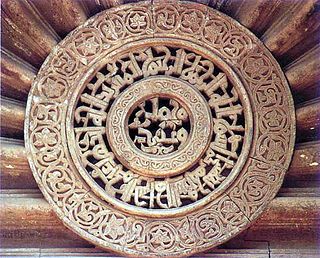
Isma'ilism is a branch or sect of Shia Islam. The Isma'ili get their name from their acceptance of Imam Isma'il ibn Jafar as the appointed spiritual successor (imām) to Ja'far al-Sadiq, wherein they differ from the Twelver Shia, who accept Musa al-Kazim, the younger brother of Isma'il, as the true Imām.
Hidayatullah is an Islamic mass organization based in Indonesia, founded in 1973. It is aimed at propagation of puritanical interpretation of Islam, and dawah (proselytization). The organization operates pesantren, mass media, women's division, and coop.
Musta'li Isma'ilism is a branch of Isma'ilism named for their acceptance of al-Musta'li as the legitimate ninth Fatimid caliph and legitimate successor to his father, al-Mustansir Billah. In contrast, the Nizari—the other living branch of Ismailism, presently led by Aga Khan IV—believe the ninth caliph was al-Musta'li's elder brother, Nizar.
Daʿwah is the proselytism for Islam. The plural is daʿwāt (دَعْوات) or daʿawāt (دَعَوات).

Da'i al-Mutlaq literally meaning 'the absolute, or unrestricted, missionary', is the most senior spiritual rank and office in Tayyibi Isma'ilism. The Da'i al-Mutlaq has headed the Tayyibi community since the seclusion of the 21st Tayyibi Imam, at-Tayyib Abu'l-Qasim, traditionally placed in 528 AH/1134 AD.
Tayyibi Isma'ilism is the only surviving sect of the Musta'li branch of Isma'ilism, the other being the extinct Hafizi branch. Followers of Tayyibi Isma'ilism are found in various Bohra communities: Dawoodi, Sulaymani, and Alavi.
Indonesia Institute of Islamic Dawah, is an independent social organization for study and research on Alqur'an and Alhadist. Dakwah is Arabic for religious proselytizing.
Satpanth is a Sanskrit term, given to a diverse group of individuals who follow Pir Sadardin. Pir Sadardin Imamshah Bawa, was a Shia Ismaili Da'i who founded the Satpanth Tariqa around 600 years ago, and taught tolerance, perennialism and syncretism of all religions, putting a particular emphasis on the syncretism of Islam and Hinduism.
Abu al-Husayn Ahmad ibn Abd Allah ibn Muhammad ibn Isma'il, commonly known as Muhammad al-Taqi, was a descendant of the Islamic prophet Muhammad and the ninth of the Isma'ili Imams, succeeding his father, Ahmad al-Wafi. Like his father, he lived primarily in Salamiyah, and Abd Allah ibn Maymun al-Qaddah, the chief missionary, continued to serve as the hijab for him. Known by the title Ṣāḥib al-Rasāʾil, al-Taqi is said to have prepared with his followers an encyclopedic text called the Encyclopedia of the Brethren of Purity. He died in 840 in Salamiyah and was succeeded by his son al-Husayn.

Da'a'im al-Islam is an Ismaili Shia Islam Muslim book of jurisprudence.
The Atba-e-Malak community are a branch of Musta'li Isma'ili Shi'a Islam that broke off from the mainstream Dawoodi Bohra after the death of the 46th Da'i al-Mutlaq, under the leadership of Maulana Abdul Hussain Jivaji in 1890. They are based in Nagpur in India. There are several hundred followers of this branch of Islam. They have further split into two more branches:

The Alavi Bohras are a Tayyibi Musta'lavi Isma'ili Shi'i Muslim community from Gujarat, India. In India, during the time of the 18th Fatimid Imam Al-Mustansir Billah around 1093 AD in Egypt, the designated learned people (wulaat) who were sent from Yemen by missionaries (du'aat) under the guidance of the imam established a da'wah in Khambhat.

Idris Imad al-Din ibn al-Hasan al-Qurashi was the 19th Da'i al-Mutlaq of Tayyibi Isma'ilis from 1428 to 1468. A major religious and political leader in 15th-century Yemen, as well as a notable theologian, Idris was also an important medieval Isma'ili historian whose work is fundamental for the history of the Fatimid Caliphate and the Isma'ili communities in Yemen.

Lisaan ud-Da'wat or Lisaan o Da'wat il Bohra or Lisan ud-Dawat is the language of the Dawoodi Bohras, a Isma'ili Shi'a Muslim communities primarily in Gujarat, following the Taiyebi doctrines and theology. The language is based on a Neo-Indo-Aryan language, Gujarati, but incorporates a heavy amount of Arabic, Urdu, and Persian vocabulary and is written in the Arabic script naskh style. Originally a ritual language, since the period of the missionaries (دعاۃ) in Ahmedabad around 1005 AH/1597 AD it has also been propagated as the vernacular language for members of the Bohra communities, but the version used by their religious leader-Saiyedna and his assembly members or clergy still differs slightly from the Gujarati spoken by their community members. The reason is that the religious sermons is highly loaded and peppered with the inputs and sentences of Arabic language having direct references with ancient sectarian Bohra literature linked with Egyptian and Yemeni phase of Da'wah. The earliest Bohras were Indian, and they spoke Gujarati. With the continuous effort of the Taiyebi leadership to promote Qur'anic and Islamic learning within the community, the language of these texts has, over time, percolated Lisaan ul-Da'wat, with Arabic words replacing part of the Gujarati lexicon.

Felix Yanwar Siauw is a Chinese-Indonesian Islamic cleric (ustad), preacher, author and da'i, known for his affiliation with the Islamist group Hizbut Tahrir Indonesia (HTI), and his hard-line puritanical position on Islamic interpretations.
Zainuddin Hamidi, also colloquially known as Zainuddin M.Z., was an Indonesian Islamic preacher, da'i, and politician. He was nicknamed as Dai Sejuta Umat due to his sheer popularity among the Indonesian society. He entered politics later in his career, first serving as an administrator of the United Development Party (PPP), and later the chairman of the Reform Star Party (PBR).
Al-Hakim al-Munajjim was a Persian Nizari Isma'ili and the first Nizari missionary (da'i) in Syria, belonging to the order of Assassins.






